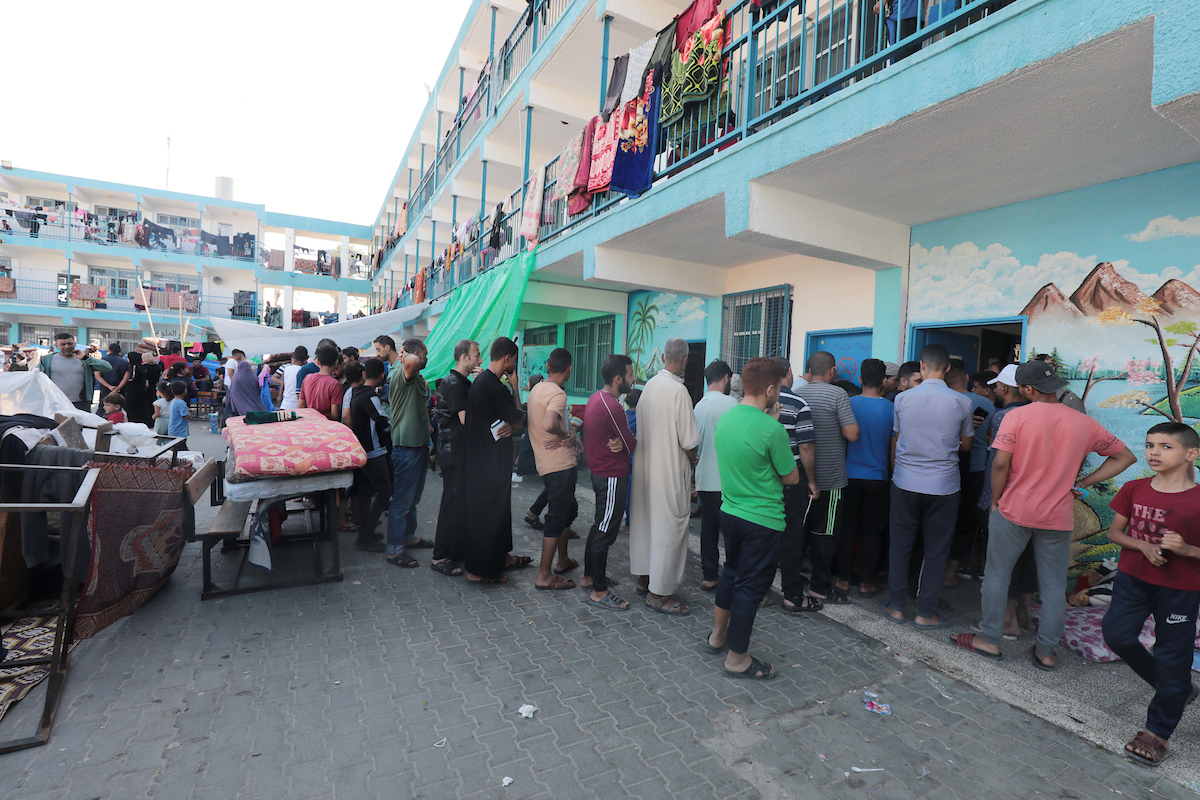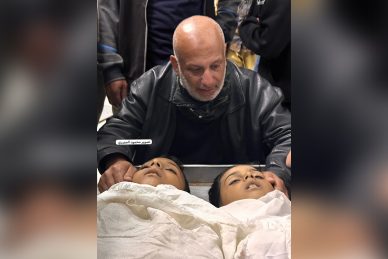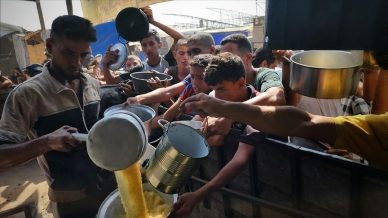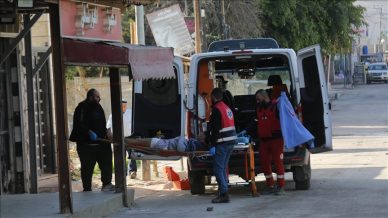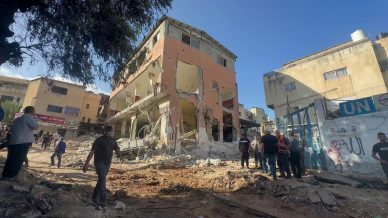After 21 days of the massacres and Holocaust carried out by Israel in the Gaza Strip obtaining bread food and water has become another crisis facing Palestinians amidst mass killings widespread destruction rockets bombs and mass displacement.
Mahmoud Abdel Majeed (18 years old) sets off every morning at dawn to take his turn in a long queue in front of one of the bakeries in the Gaza Strip to secure a loaf of bread for his family amidst the depletion of fuel supplies from the markets and the lack of electricity and fuel for homemade bread.
Abdel Majeed said “After 3 or 4 hours I get my share and return to my family then another family member goes to secure our water needs we rely on God and He is the best protector.”
The War of Starvation and Thirst
The Euro-Mediterranean Human Rights Monitor described what is happening in Gaza as a war of starvation and thirst warning of the spread of epidemics in conjunction with Israel’s mass killings and widespread destruction of residential neighborhoods for the past 21 days.
According to The Monitor there are deliberate Israeli bombing operations aimed at exacerbating the crisis of food and supply shortages which have reached their peak in recent days.
Destruction of Bakeries
Salama Marouf the head of the Government Media Office confirmed that Israeli warplanes have destroyed 10 bakeries so far. The latest was the Al-Maghazi bakery which was targeted on Wednesday evening just hours after it was supplied with flour from the United Nations Relief and Works Agency for Palestine Refugees (UNRWA). This resulted in its destruction and the death of 10 Palestinians who were queuing to buy bread.
Salama pointed out that some of the targeted bakeries had received quantities of flour from UNRWA to meet the needs of hundreds of thousands of displaced people in the southern and central areas of the Gaza Strip which Israel designated as a supposed safe zone despite subjecting it to hundreds of airstrikes around the clock.
The Euro-Mediterranean Human Rights Monitor concluded that Israel intentionally targeted markets and shopping centers during peak times when people were buying their necessities. This indicates a decision to paralyze and hinder civilians’ access to these centers to secure some of the remaining food supplies.
Salama recalled that It should be noted that Israeli shelling also targeted a warehouse for UNRWA’s food supplies in northern Gaza during the early days of the widespread military offensive against the Strip.
The Israeli war also targeted water installations. After the Israeli decision to cut off water supplies to the Gaza Strip and the failure of most wells due to lack of fuel for pumping the Euro-Mediterranean Human Rights Monitor documented Israeli attacks targeting alternative water installations that municipalities had set up to supply water to residential areas and refugee shelters as what happened in Khan Yunis in recent days. This indicates a political and military decision by Israel to deprive civilians of their right to access water.
This is accompanied by a severe exacerbation of the crisis of an acute shortages in basic resources such as water food and medicine while about 1.5 million out of 2.3 million people have been displaced from their homes and the majority of them are living in shelters schoolyards and hospitals without any of their basic needs.
Fuel which is urgently needed to operate backup generators is still prohibited from entering the Gaza Strip by an Israeli decision. As a result UNRWA the largest humanitarian aid provider in Gaza has almost exhausted its fuel reserves and has begun to significantly to reduce its operations.
The fuel crisis also threatens a complete shutdown of the remaining bakeries in the Gaza Strip while warnings escalate about the effects of food insecurity including the risk of malnutrition for women and children which negatively affects their immune health and increases the risk of death for both mothers and children.
A 52-year-old displaced woman in a shelter center in Gaza said that a couple of days ago she experienced severe stomach pain followed by severe nausea. It turned out that she was not the only one affected; many of the displaced people with her suffered from consuming spoiled food in the absence of electricity.
And the human rights monitor warned that the residents of the Gaza Strip are threatened by a widespread epidemic due to the large overcrowding in shelters in addition to the shortage of safe drinking water lack of hygiene and personal cleanliness.
Workers in relief organizations said that primary care centers have recorded thousands of cases of infectious diseases in recent days mostly among children. These diseases include diarrhea food poisoning skin diseases scabies and respiratory infections in addition to dozens of cases of chickenpox.
A man identifying himself as “Abu Hamed Ouda” in a shelter center in northern Gaza told the Euro-Mediterranean team that his five children have skin diseases and scabies due to the shortage of clean water the sewage crisis and the absence of care resulting from the evacuation of UNRWA employees.
Epidemic risk
The risk of epidemics is escalating alongside the accumulation of waste in residential areas with severe difficulties facing municipal crews in terms of collecting waste due to Israeli airstrikes and the fuel crisis as well as the prohibition of their access to the main landfills located on the border outskirts of the Gaza Strip in order to transport garbage which poses a serious health and environmental disaster.
The Monitor documented that in Gaza City alone about 16000 tons of waste have accumulated with only 50% of it collected and currently being stored in two temporary centers located in the city center.
Israeli admission of the war of starvation
The Euro-Mediterranean Monitor also recalled what Israeli Minister of War Yoav Galant announced on October 9 in a television statements in which he said “We have imposed a complete siege on the Gaza Strip no electricity no food no water no gas everything is closed” claiming that this is a part of a battle against “Some human animals.”
As previously mentioned the Israeli Minister of National Infrastructure Energy and Water also announced on the evening of October 7 that Israel would stop supplying electricity to the Gaza Strip as an additional step of collective punishment.
The Euro-Mediterranean Monitor pointed out that these statements reflect an official Israeli position to implement a war of starvation thirst and deprivation of the necessities of life for more than 2.3 million people in the Gaza Strip in a precedent that is almost unprecedented in the modern history.
All of this is done with the support and backing of the United States and many European countries while the international community is unable to stop the humanitarian catastrophe that is occurring.
The human rights Monitor emphasized that everything happening in Gaza represents a real embodiment of genocide. Israel has committed all of these terrible violations on a massive scale with an explicit official decision from the highest political and military levels in an unprecedented occurrence in the history of armed conflicts.
The Monitor also stressed that the escalation of Israel’s retaliatory policies its approach based on genocide and its serious violations of the rules of international humanitarian law require urgent intervention from the international community and the United Nations to ensure an immediate cessation of these actions hold those responsible accountable and put an end to the double standards that have governed the positions of many countries and parties so far at the expense of human rights.

